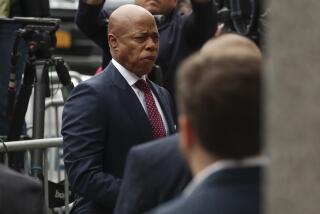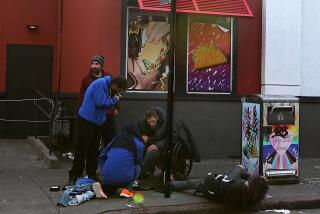Testimony on Barry’s Car Phone Calls Closes Prosecutors’ Case
- Share via
WASHINGTON — Federal prosecutors rested their drug and perjury case against Mayor Marion Barry Wednesday with testimony that he had made more than 2,000 calls from his car phone to friends who allegedly supplied him with drugs.
The statements from District of Columbia Police Sgt. James Pawlik capped five weeks of testimony in which 10 government witnesses have described the three-term mayor as a habitual cocaine user who sniffed or smoked the substance over the last seven years in hotel rooms, in private homes, on pleasure boats and on repeated vacation trips to the Caribbean.
Under cross-examination, Pawlik acknowledged that he did not know what was said during the calls made from Barry’s official automobile.
While Barry faces one misdemeanor count of conspiracy to possess drugs and 11 more misdemeanor counts of simple drug possession, the most serious charges against him are three felony counts of lying about his drug use to a federal grand jury last year.
The perjury charges each carry a maximum possible punishment of five years in prison and constitute Barry’s principal worry, according to his associates. All relate specifically to his denial under oath that he had used drugs with one old friend, former city employee Charles Lewis, or that he knew about Lewis’ drug habit.
Lewis, the prosecution’s first major witness last month, said he and Barry repeatedly used cocaine in December, 1988, in Lewis’ room at the Ramada Inn here and that Barry had phoned him afterward to discuss a cover-up story.
Before testifying to the grand jury the following month, Barry called a press conference outside his office to deny reports that he had made repeated visits to Lewis’ room to use drugs. Lewis, however, told trial jurors that he and Barry had smoked crack cocaine in the Virgin Islands as well as in Washington.
Last Jan. 18, Barry was arrested in an FBI sting operation after being videotaped smoking crack in another hotel room with a former girlfriend, Rasheeda Moore, who was cooperating with the government.
While the 83-minute videotape made with a hidden camera has comprised the government’s most dramatic evidence against Barry, federal prosecutors have spent much of the last five weeks putting on a parade of witnesses to testify firsthand about the mayor’s long-term drug use. This testimony apparently has been intended to counter defense arguments that Barry was unfairly entrapped by Moore and FBI agents and was not “predisposed” to use the cocaine last January.
Defense attorneys are scheduled to start presenting their case this morning in the courtroom of U.S. District Judge Thomas Penfield Jackson. The case may go to the jury by the middle of next week, according to R. Kenneth Mundy, Barry’s chief lawyer. Barry is not expected to testify on his own behalf.
Barry’s defense strategy, reflected in his public statements in recent weeks, is to picture himself as a victim of the Republican-controlled federal power structure in Washington. Before jurors were sequestered in a hotel at the start of his trial, he made a public appeal for some to refuse to vote for his conviction.
Later, he went on a local television station to extol his accomplishments for District of Columbia residents and to announce he would not seek an unprecedented fourth term this year.
More to Read
Sign up for Essential California
The most important California stories and recommendations in your inbox every morning.
You may occasionally receive promotional content from the Los Angeles Times.













